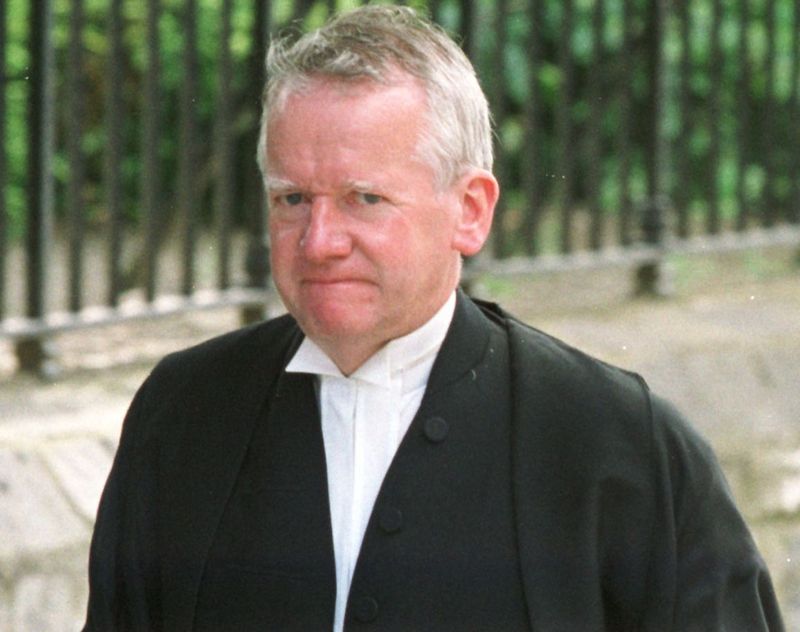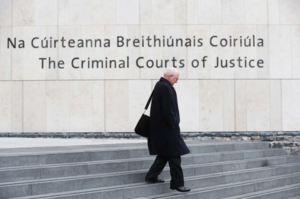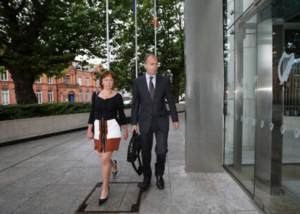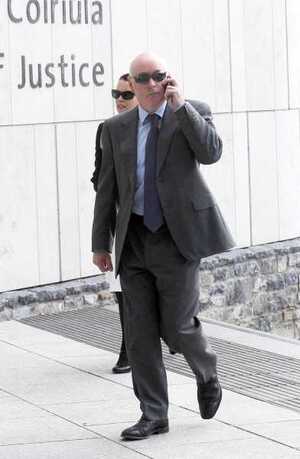
Retired judge Barry White
Justice Barry White, who retired from the Central Criminal Court last week, spoke to Seán O’Rourke on RTÉ Radio One this morning.
During the interview, Justice White said he believed there should be a minimum sentence of 14 years for knife crime, instead of the current average of seven to nine years.
They later talked about sentencing in the case of rape and refer to a rape trial Justice White presided over in February, in which he imposed a seven-and-a-half year sentence, with three-and-a-half years suspended, on developer Thomas Egan of Cahermurphy, Kilmihil, Co Clare for the rape of a Brazilian woman.
At the time of the sentencing, Justice White commented that the woman was “more interested in compensation rather than anything else”.
From the interview:
Seán O’Rourke: “And what about, say, a rape sentence then? For somebody who has perpetuated a rape? You seem and, again without going into individual cases, to have varied the sentences that you would have imposed in those ones.”
Barry White: “You have to look at the particular circumstances of the act of rape. There can be some very violent ones, there can be less violent ones. So that’s a factor that you have to take into account. And you also have to take into account the position of the individual, who has committed that offence.”
O’Rourke: “In other words, the efforts they have made maybe to make restitution or what? I mean, is it not just a cut and dry situation – if a man rapes a woman, there should be a certain minimum sanction?”
White: “Well, I mean the Court of Criminal Appeal, I don’t think it was the Court of Criminal Appeal, I think it was the Supreme Court who said their must be an immediate and substantial sentence imposed in the case of rape.”
O’Rourke: “Yes, but it can be as low as what? Sometimes, what? Four or five years? Some of that suspended?”
White: “It can be. And there are other matters in which it is, it’s sometimes been extended up as far as perhaps 14 or 15 years. Indeed I think my colleague Paul Carney might have imposed life.”
O’Rourke: “And I think there might be one particular case where you imposed a sentence in which the Rape Crisis Centre considered to be insufficient and they talked about the need for judges to be trained and educated and they were happy to provide such training. How would you respond to something like that?”
White: “How would I respond to that? Well, the first thing I would say, that particular case was one in which I took a view that, on the victim impact report, or statement, and the victim seemed to have a considerable interest in compensation for the offence. She was a non-national. And, afterwards, the Rape Crisis Centre, commented that sort of that was the approach in her particular country. Now, certainly, that was something that I was not aware of but neither, apparently, were the prosecuting authorities and whether it is correct or not, I do not know. I don’t believe that judges need training in relation to sentencing, in cases of a sexual nature. There may be judges who are inexperienced in dealing with crime, who find themselves sitting in the Central Criminal Court, from time to time, but most judges who sit in the Central Criminal Court have had long criminal experience, have had substantial criminal practices over protracted period of time. And they are fully aware, as to the parameters within which a sentence should be imposed.”
Later
O’Rourke: “I think again, there was a, the Rape Crisis Centre was quite exercised I think by your suggestion that a victim, and perhaps I think it was even the same one that you were talking, that we were talking about a few moments ago, that you didn’t believe the victim had suffered a profound, psychological effect. Is that something, judge, that should, or ought to, affect the sentence?”
White: “Well, as I say, the effects of the crime on the individual, on the victim, is something that you have to bear in mind, you have to take into consideration. And if you think that somebody is trying it on, and is seeking to influence you, adversely, from the point of view of the accused, and in favour of a heavy sentence, you must just have regard to that and you say, ‘No, sorry, I’m not going to wear this, I’m not going to have a situation in which somebody is seeking to influence me in a manner in which I should not be influenced’.”
O’Rourke: “But on the other hand is it not the objective act itself, the objective crime that should carry the sentence and that that’s what should attach the weight, as opposed to the impact, I mean some people are stronger than others, they will survive, maybe more readily than others. That’s understandable but why should that individual see a lesser sentence opposed on the perpetrator.”
White: “They’re not seeing a lesser sentence imposed on the perpetrator. A judge is looking at the hard cold facts of the act itself and, as I say, the nature of rape can vary greatly. There can be very violent ones and there can be less violent ones. I mean rape is a crime of violence and you can’t say it isn’t a violent offence. But there are parameters or degrees of gravity and then these are matters that have to be taken into account. And if you consider, on the acts that you have heard and that the jury has heard, that it is a particular class of rape, from the point of view of determining where it might lie on the spectrum of gravity, then you must view it from that point of view. And a victim should not be subject to seeking, in the circumstances, to say, ‘No, no, this isn’t one that fits into the middle range, this is one that fits at the very top end of the range’.”
O’Rourke: “So there is that element of nuance there, in the way you will listen and assess?”
White: “Yes.”
Listen back in full here
Listen to clip of full interview here
Previously: A Limerick A Day
Related: No judges accept offer of Rape Crisis Centre training (RTÉ)
Meanwhile…













